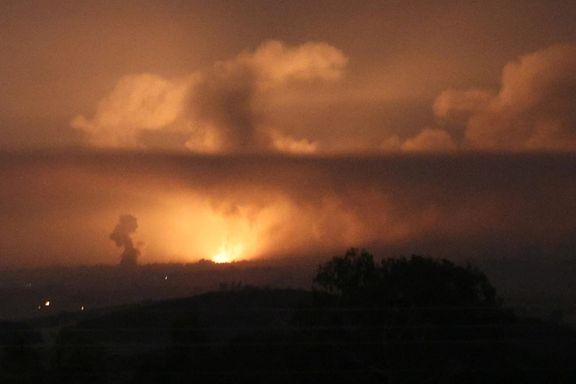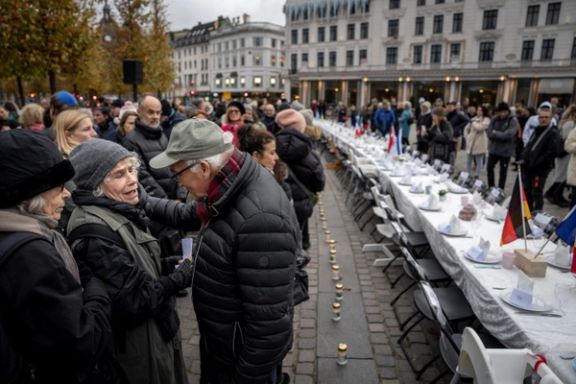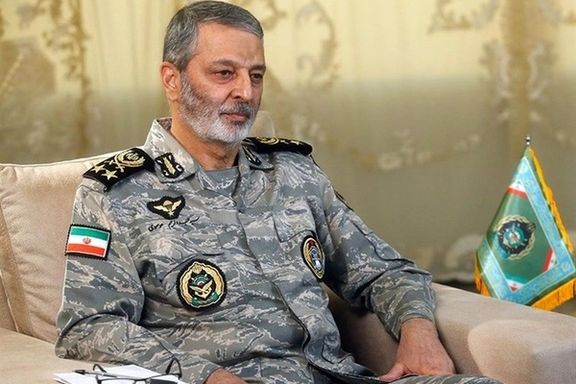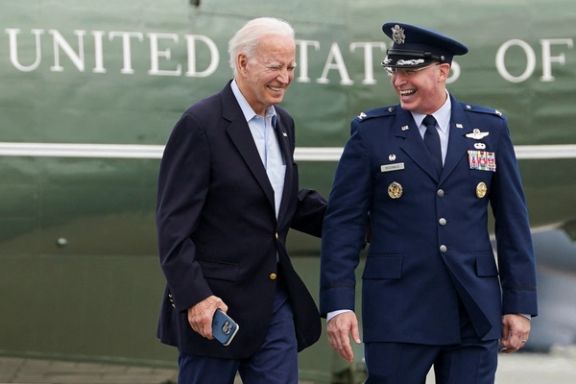Turkey Trying To Extradite Iranian Rights Activist

Shilan Mirzaee, a human rights and political activist, is in danger of being deported to Iran because of increased pressure on Iranian asylum seekers in Turkey.

Shilan Mirzaee, a human rights and political activist, is in danger of being deported to Iran because of increased pressure on Iranian asylum seekers in Turkey.
Mirzaee was recently detained in Izmir and transferred to the Bandirma deportation center in northern Turkey.
During an audio message on Thursday, Ms Mirzaee described her situation and stated that if she were to be returned to Iran, she would be subjected to severe punishment.
Attempts to deport her are being made despite her claim that she has "the approval of the United Nations and the Immigration Police" in her file and that she has not engaged in any activities against the Turkish government.
Authorities have not explained why this activist was arrested and transferred to the detention center.
In recent years, the situation of Iranian political and civil refugees living in Turkey has deteriorated.
Shilan Mirzaee has described threats made by individuals associated with the Iranian Embassy, including two women who she alleges were attempting to kidnap her, and threats made against her son in front of school.
Iran International reported in August about the situation of an Iranian refugee in the Aydin Removal Center who was being physically and mentally tortured by the camp director.
He explained that the officials of the camp keep the asylum seekers under the sun so that they will sign the deportation papers to Iran.
Last year British television channel ITV reported that affiliates of the Iranian regime are threatening to kidnap political refugees in Turkey.
An asylum seeker was quoted asserting that Iran has become very adept at kidnapping and killing opponents.

Iran says the "unauthorized Starlink operations" within the country must stop and Elon Musk’s satellite internet company must secure licenses for its activities.
During a session concluding on Friday, the International Telecommunications Radio Regulations Board of the ministry of telecommunications identified Starlink's satellite internet services as being in “violation of international regulations.”
The move comes in the context of Iran's well-known strict internet control and censorship practices, characterized by thousands of websites being blocked since the early 2000s and most social media platforms banned. With the absence of independent media and heavy censorship, many Iranians mostly depend on social media for their source of political news and information.
Last year, the Iranian government issued a 10-day ultimatum to Meta Platforms, the parent company of WhatsApp Messenger and Instagram, demanding they establish offices within Iran to have their apps unblocked. The intention behind the ultimatum was to exert control over Meta Platforms' operations, although the demand was ultimately rejected by the company.
Following nationwide protests in Iran last year, the Iranian regime significantly curtailed internet access for its citizens. In response, the US government relaxed some of its sanctions on exporting internet services to Iran, allowing SpaceX to provide the Stralink satellite internet services in the country.
Elon Musk, the owner of both SpaceX and the Starlink, recently revealed that the Iranian regime expressed dissatisfaction with the introduction of Starlink internet services within the country. He noted that the satellites were introduced discreetly during widespread internet shutdowns. Musk shared a letter from Iranian leadership during a meeting with the Israeli Prime Minister Benjamin Netanyahu in California.

Signs on the ground in Gaza on Saturday morning indicated the commencement of a long-anticipated Israeli ground operation following hours of heavy air attacks.
Some said Gaza looked like hell on earth, with huge flames resembling volcanic eruptions Friday night into Saturday morning.
Israel said on Saturday morning its troops, sent in on Friday night, were still in the field, without elaborating. The country had earlier made only brief sorties into Gaza during three weeks of bombardment to root out Hamas militants, who killed 1,400 Israelis, mostly civilians, in a terror raid on October 7.
Israelis say their air force is striking tunnels dug by Hamas and Islamic Jihad to store rockets, weapons and use as springboards for attacks.
Early Saturday, a few hours after Israel confirmed the expansion of its military operation in Gaza, Hamas announced it is ready to fight the Israelis with "full force."
"Netanyahu and his defeated army will not be able to achieve any military victory," read Hamas’ statement.
On Friday night, the armed wing of Hamas reported confrontations between its fighters and Israeli troops in Gaza's northeastern town of Beit Hanoun and the central region of Al-Bureij.

"Al-Qassam Brigades and all Palestinian resistance forces are fully prepared to confront the aggression with full force and thwart the incursions," Hamas said.
As Israel’s bombardment of Gaza intensifies, the head of the UN agency for Palestinian refugees has warned that “many more will die” from shortages.
“People in Gaza are dying… not only from bombs and strikes, soon many more will die from the consequences of [the] siege,” Philippe Lazzarini, the UNRWA chief, said.
There’s been unconfirmed reports of explosions near Gaza’s main hospital. Israelis claim Hamas uses the hospital as a shield for its underground command center –an allegation the Palestinian side has flatly rejected.
Hamas is backed by Iran, which also supports proxy militias in Lebanon, Syria, Iraq and Yemen. The Israeli military said it had stopped a missile fired from Lebanon at one of its drones and was striking the launch site, the latest in what have been the most serious clashes on the border since 2006.
As humanitarian concerns increase, international institutions are calling for de-escalation and a halt on attacks to allow them to help civilians trapped in the densely populated enclave.
The UN’s general assembly passed a resolution to that effect Friday evening. The initiative by Arab states passed with 120 votes in favor, 45 abstains and 14 against, including Israel and the US.
Israeli officials say there would be no let off in military operations or the siege on Gaza strip until they ‘root out’ Hamas.
The Biden administration has maintained all along that Israel has a right to self defense and should be supported not stopped in its relentless attack on Gaza.
Israeli airstrikes have killed at least 7,000 in Gaza, according to Palestinian officials, who have published a long list of all casualties with their personal details for verification.
Getting information from Gaza has become all but impossible, since Israel cut internet and phone networks coinciding with its expanded operation.
International organizations say they can no longer function or even reach staff in Gaza. Lynn Hastings, an official from the UN’s Office for the Coordination of Humanitarian Affairs (OCHA), said that UN hospitals and humanitarian operations “can’t continue without communications”.
Gaza has been in darkness for more than two weeks. The Israeli government cut off electricity after Hamas militants attacked Israel (October 7), killing more than 1,400 and taking more 200 hostages.
Now the blackout seems to have extended to communications.

The Commander-in-Chief of Iran's traditional Army said they are "always ready to respond to threats", on the sidelines of a two-day drill in the central Province of Esfahan.
In his remarks, Abdolrahim Mousavi described the objective of the ground forces exercise as "developing the nation's defense and combat capabilities in the face of potential threats."
Although the army claims that these exercises have a two-fold objective of "giving hope to friendly countries" and "sending a message to enemies", it appears that it is failing to accomplish these goals. A senior Hamas official told The Associated Press on Thursday that they expected Iran's most powerful proxy force, the Lebanese Hezbollah to be more active in the war against Israel.
Ghazi Hamad, a member of Hamas’ political bureau, said that “we need more in order to stop the aggression on Gaza… we expect more” from allies, including Hezbollah.
There have been several cross-border strikes by Israel and Hezbollah since the Gaza war began on October 7. However, no all-out fighting has taken place. The Lebanese armed group, part of the Iran-led 'Axis of Resistance', has maintained a relatively low level of activity.
The US government reports that the Shiite armed group has received direct Iranian financial support over the past decade, which has recently totaled about $700 million per year.
Furthermore, although Hassan Nasrallah, the leader of Hezbollah, met with Hamas and Islamic Jihad leaders on Wednesday, he has not made one of his usual public televised speeches in support of these groups following their declaration of war against Israel.
While Iran's officials have made raging statements threatening escalation, it does not appear that they are seeking a major war.

US President Joe Biden says Washington is prepared to take additional measures following a series of attacks by Iran-linked groups targeting US forces in Iraq and Syria.
Early on Friday, US fighter jets carried out airstrikes in eastern Syria, targeting locations associated with Iran's Revolutionary Guard Corps. The strikes were a response to a barrage of drone and missile attacks against US bases and personnel in the region that began the previous week.
In a letter addressed to the new House Speaker Mike Johnson, Biden made it clear that the recent strikes were executed with the aim of establishing deterrence.
“The strikes were intended to establish deterrence and were conducted in a manner to limit the risk of escalation and avoid civilian casualties. I directed the strikes in order to protect and defend our personnel, to degrade and disrupt the ongoing series of attacks against the United States and our partners, and to deter Iran and Iran-backed militia groups from conducting or supporting further attacks on United States personnel and facilities,” read his letter.
US Defense Secretary Lloyd Austin, in a statement, described the precise self-defense strikes as a response to a prolonged series of mostly unsuccessful attacks on US personnel in Iraq and Syria by Iranian-backed militia groups, commencing on October 17.
Meanwhile, on Friday, the IRGC-affiliated news agency, Tasnim, reported that gunmen in eastern Syria fired ten rockets at a base housing American troops in retaliation for the US airstrikes. A US official confirmed the rocket attack, noting that there were no reported casualties.

Armita Geravand, a 16-year-old student who suffered a head injury in an encounter with Tehran’s hijab police has passed away in hospital, reports said on Saturday.
On October 1st, Armita, a high school student, fell into a coma after she was stopped by hijab enforcers in Tehran subway. Although, the government prevented any clear information about what took place, but apparently a woman agent pushed her and Armita fell, receiving a severe head injury.
There was a tight police cordon around her in Tehran's Fajr Hospital to prevent photographs or information from reaching the public. Earlier reports in the Iranian state media indicated that the 16-year-old was brain dead.
Earlier, Iran International received information that Armita Geravand's family faced pressure from authorities to relocate her body discreetly from Tehran to Jafar Abad, Kermanshah, in the event of her death, revealing it was at the order of Iran's Leader, Ali Khamenei.
Following the death of Mahsa Amini in September 2022, the Iranian clerical regime is apprehensive about a resurgence of the extended anti-establishment protests and the 'Women, Life, Freedom movement' seen last year.
The circumstances of Geravand's case closely resemble those of Mahsa Amini's death last year while she was in the custody of morality police. In both instances, the regime denied any wrongdoing but pressured the families to refrain from speaking to the media.
The regime's explanation of what caused the death of this teenage girl has been questioned on social media. Many emphasize that she was "killed" by hijab enforcers, much like Mahsa Amini's case, when the government tried to offer an explanation that she had pre-existing health issues, but the public did not believe it.
Information obtained by Iran International had indicated that additional family members and relatives of Armita Gravand had been threatened and are prohibited from discussing her condition with the media.
There were concerns among the Geravand family and their relatives that security agents might have installed eavesdropping devices or cameras inside their residences, causing them to feel unsafe in their own homes.
Moreover, her parents were required to sign a statement committing not to file a complaint against "any individual, organization, or entity."
Her death has triggered a flood of swift reactions from activists, journalists, and others who have turned to social media to protest against the regime and mourn her passing.
Behnam Gholipour, journalist, wrote on X: "The [political] system that killed this sweet girl is the flagbearer for Gaza."
Political commentator Sadegh Zibakalam in Iran also expressed condolences to Armita's family following her passing, saying: "I hope her death will cause the system to reconsider its stance on compulsory hijab. How many Mahsas and young Armitas must be buried before the authorities accept that you cannot force people to wear the hijab or remove it?"
Iran's parliament passed a stringent 'hijab bill' on the first anniversary of Mahsa Amini's death in mid-September, which, if violated, can result in ten years' imprisonment. Women have been required to wear the hijab by Iran's theocratic establishment since 1979, when the secular Shah was overthrown. However, the 'Women, Life, Freedom' movement has permitted more women to appear unveiled in public places, including malls, restaurants, and stores.
In response to the hospitalization of Armita Geravand, Amnesty International has asked the international community to urge the Iranian authorities to allow an independent international delegation, including UN experts, to investigate the incident.